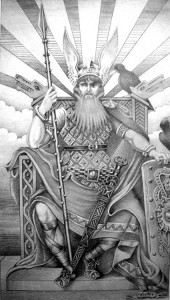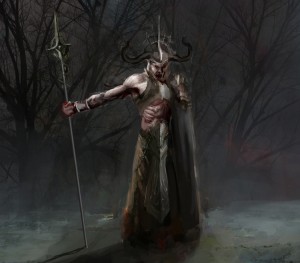Mythic Monday: Odin the Allfather
Monday, August 21st, 2017August 21, 2017
Odin, the one-eyed Norse god of war and the battlefield was revered by Berserkers, frenzied Viking warriors who fought ferociously without armor and felt no wounds. But Odin was a complex character who also had domain over wisdom and poetry. Norse mythology, also called Teutonic mythology, consists of the myths and legends of Scandinavia and Germany. The foremost god in the Norse pantheon, Odin was father to many of the Aesir (Norse race of gods), including Thor and Balder, and a father-figure to others such as Loki. For this reason, Odin was often known as “Allfather.”

Odin the Allfather of Norse mythology. Credit: Victor Villalobos (licensed under CC BY-SA 4.0)
The magnificent hall Valhalla was Odin’s home in Asgard, the domain of the Norse gods. There he feasted with the souls of heroes who had died in battle. A fearless fighter himself, Odin carried a spear as his weapon, and he rode an eight-legged horse called Sleipnir. Before battle, Odin would cast his spear over the forces of one side, choosing them as the victors. He then sent in the Valkyries, a group of warlike goddess-maidens, to choose which warriors lived and died and then to carry fallen heroes to Valhalla.
Odin was the wisest god; he had an unquenchable thirst for knowledge. Two ravens, Huginn and Muminn, sat by his side and told him all they saw throughout the world each day. Odin gained his greatest wisdom from Mimir, a mysterious and ancient being who guarded a well whose waters were the source of all knowledge in the universe. Visiting one day, Odin asked for a drink from this well of knowledge. Mimir refused unless the god offered something of value in return. Without hesitation, Odin plucked out one of his eyes and dropped it into the water. Seeing that Odin made the necessary sacrifice, Mimir reluctantly dipped his cup into the well and gave the one-eyed god a hearty drink.
Odin himself spoke only in verse, and poetry was a gift he granted only to select people to whom he offered a sip of his magical mead (honey wine). Odin stole this mead of poetry from the greedy giant Suttung, who hoarded the precious liquid in a huge vat. The mead gave anyone who drank it the ability to speak in beautiful prose. To steal the drink, Odin swallowed the entire vat and took the form of an eagle to escape the enraged giant. Weighed down by the mead held in his throat, and with Suttung in hot pursuit, Odin barely reached the safety of Asgard’s walls. He spat the mead into a huge container and has guarded it ever since. However, a few drops spilled and fell to Earth, where the precious liquid is the source of all bad poetry among humans today.
Wednesday, from the Anglo-Saxon word Wodensday (Odin’s day) is so-named to remind people of Odin’s all-seeing presence and to always be hospitable. Hospitality was an essential virtue for the people of northern Europe. Odin often wandered across the land wearing a wide-brimmed hat to shade his face, calling unannounced on homes and farms. The people of northern Europe knew never to turn away a weary traveler—it just might be the mighty Allfather in disguise.



